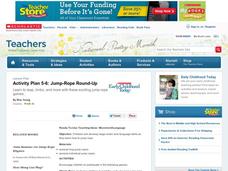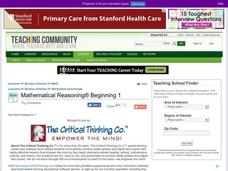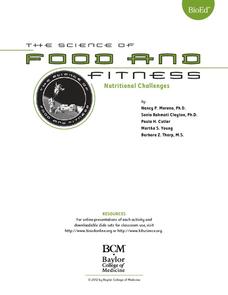Curated OER
Muppets as Mediators
Learners explore current social issues in the Middle East to create their own student television programs for Palestinian and Israeli Students.
Education World
Every Day Edit - Crater Lake
In this everyday editing activity, students correct grammatical mistakes in a short paragraph about Crater Lake. The errors range from capitalization, punctuation, spelling, and grammar.
Curated OER
Pattern Block Design
In this using pattern blocks to create a design worksheet, students read and apply criteria to create a design with pattern blocks, trace it, and draw lines of symmetry. Students complete four pattern block activities.
Curated OER
An Introduction to Jan Brett
Students explore the concept of Jan Brett. In this author study lesson, students are introduced to several Jan Brett books with visuals, listening centers, and video. Students browse the internet in search of information about Jan Brett.
Curated OER
Halloween Literature Unit: Arthur’s Halloween
Students read the story "Arthur's Halloween" and discuss how they have helped someone. In this "Arthur's Halloween lesson plan, students play a game that strengthens their listening skills. Students participate in identifying individual...
Curated OER
Using a Computer to Write a Letter – Verbs (Sequencing)
In this sequencing learning exercise, students will cut out sentences about how to write a letter using a computer. Then students will rearrange the sentence strips in chronological order.
Curated OER
Jump-Rope Round-Up
Young scholars engage in group jump rope activities. In this jump rope lesson, students follow directions to play various jump rope games, some with specific songs attached. There are 4 different renditions of jump rope activities...
Curated OER
Mathematical Reasoning
In this data analysis worksheet, students read a list of 4 criteria and then select the picture on the sheet that matches the criteria.
Curated OER
Middle East Map Activity
In this Middle East map learning exercise, students follow the instructions provided to label 24 Middle Eastern countries and other geographical features on a blank outline map.
Perkins School for the Blind
Treasure Hunt
On, over, and under are some very common prepositions; but how can you teach these concepts to children with visual impairments? Here, is one way. Kids will practice following verbal commands as they go on a classroom treasure hunt. They...
BioEd Online
Bone Structure: Hollow vs. Solid
What is meant by the phrase "form follows function?" Allow your budding biologists to discover first-hand through two activities. In the first, groups work together to discover whether a solid cylinder or an empty cylinder can support...
Mathematics Assessment Project
Classifying Proportion and Non-Proportion Situations
Proportions, proportions, everywhere. Class members complete an assessment task solving problems involving proportionality. They then complete an activity classifying given situations as proportional or non-proportional.
Computer Science Unplugged
Treasure Hunt—Finite-State Automata
Introduce your class to the concept of finite-state automata with an activity that asks individuals to try to map their way to Treasure Island by taking different routes though an island chain. Each island has two ship sailing to...
MENSA Education & Research Foundation
Inside Out Fun!
It's amazing what you can do with a little bit of soap, baking soda, and corn starch. Follow the directions in this packet, mix up a batch of fun, and turn young scientists and artists loose to experiment and create chalk, paint, and...
Novelinks
Zach’s Lie: Magic Squares
Individuals match vocabulary words within a magic square, a concept that ties in nicely with math class. The words are all located in Zach's Lie and were specifically selected to increase comprehension of the text. Fifth in a series of...
BioEd Online
Arm Model
Arm your young scientists with knowledge about anatomy as they build their own model of the elbow joint. Help them get a firm grasp on how muscles and bones interact to allow movement as they try different positions for the muscles on...
Curated OER
Direct Effect
Discover the damage that was caused by the terrorist attacks on September 11th with your class. They will learn about the events of that day and the litigation process for damages incurred that day. Their research will cover the various...
BioEd Online
Spiders in Space
Does a spider spin its web differently in space? What other ways might microgravity affect an arachnid? Pick a topic to research, plan an investigation, and follow astronauts on the International Space Station as they perform some of the...
BioEd Online
Nutritional Challenges
Eating healthy can be a challenge, especially for people with special dietary needs. After learning about standard nutritional needs for adults, learners take on the role of a dietician and work together to create a menu for one of the...
Centre for Clinical Interventions
Social Skills Treatment Programme
Even though they may not be tested on standardized assessments, social skills are vital for students to develop during their years in school. Through a series of discussions, activities, and role-playing exercises, these lessons teach...
Cornell University
Bridge Building
Bridge the gaps in your knowledge of bridges. Individuals learn about bridge types by building models. The activity introduces beam bridges, arch bridges, truss bridges, and suspension bridges.
Baylor College
Energy Sources
Take the concept of burning calories to a more literal level in the second of seven lessons about energy in the realm of food and fitness. Using simple materials, groups will burn breakfast cereal and a pecan to see which one gives off...
Baylor College
Heart Rate and Exercise
Teach your exercise enthusiasts to read their pulse rate at the radial artery and multiply by four to calculate beats per minute. Learners perform a variety of activities, recording their heart rates after one minute of each. Though this...
Baylor College
Need or Want?
Even as adults it can be hard to distinguish needs from wants. Using pictures of common, everyday items, children make a pocket chart separating the objects they need from those that they want. Discuss their choices, explaining that...

























